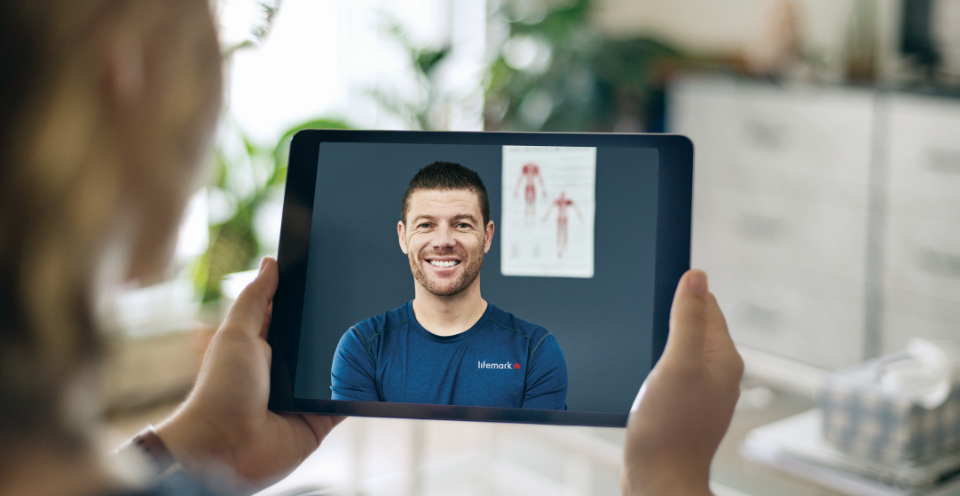Address:
Phone: 902-354-7004
Fax: 902-356-3055
We are offering a variety of virtual care services. Call our clinic to learn more or to book an appointment.
Hours of operation
- Mon:8:00am-4:00pm
- Tue:8:00am-7:00pm
- Wed:8:00am-8:00pm
- Thu:8:00am-8:00pm
- Fri:8:00am-12:00pm
- Sat:Closed
- Sun:Closed
The clinic is located above Pharmasave on Main Street of downtown Liverpool, and has access to parking beside Pharmasave.
Clinic information
Clinic information
Functional Restoration
Functional Testing
Work Conditioning/Hardening
Myofascial Release Therapy
Neurological Rehab
Nutrition
Our team
Our team
-
PedorthistType Pedorthist Book onlineLanguages: English
-
PhysiotherapistType Physiotherapist Book onlineLanguages: English, Dutch
-
PhysiotherapistType PhysiotherapistLanguages: English
-
PhysiotherapistType Physiotherapist Book onlineLanguages: English
Common conditions we treat
Common conditions we treat
-
Hand and wrist pain
Hand, fingers and wrist pain can include symptoms such as tingling, numbness and weakness. The most frequent causes are carpal tunnel syndrome, injury or overuse. An assessment and treatment protocol by a physiotherapist can help.
-
Knee pain
Knee pain can be caused by bursitis, a torn tendon, ACL tear or injury and overuse. It is most frequently the result of osteoarthritis. Physiotherapy can help speed recovery.
-
Low back pain
Low back pain is one of the most common patient complaints. It can result from arthritis, spinal stenosis, scoliosis, sciatica, injury or overuse. An assessment from a physiotherapist or chiropractor can help provide a diagnosis and treatment plan.
-
Muscle sprains and strain
Muscles sprains and strains can result from sport or motor vehicle injuries, overuse or common activity. They can range to mild, moderate to severe requiring more intensive intervention. Physiotherapy and massage therapy can help speed recovery.
-
Neck pain
Neck pain can result from poor posture, injury like whiplash, infection in the lymph nodes or throat, or a herniated disc. Physiotherapy, massage therapy or chiropractic treatment can help improve mobility and pain.
-
Post-surgery
Complications following surgery can include pain, limited mobility, numbness and emotional issues. An assessment from a qualified physiotherapy along with a detailed treatment plan can help to alleviate post-surgery challenges.
-
Rotator cuff injuries
The rotator cuff consists of four muscles that surround the shoulder blade (scapula), and help to hold the arm bone (humerus) in the shoulder capsule. It is easily injured by sport, repetitive use and common daily activity. Physiotherapists can help diagnose and treat symptoms.
-
Sciatica
The sciatic nerve run from the lower back, through the hip and into each buttock before traveling down each leg. Sciatica is the term used to describe the symptoms when there is pressure on the nerve, causing pain in the lower back, hip or buttock. Physiotherapy or chiropractic services can help relieve sciatic pain.
-
Scoliosis
Scoliosis is when an individual's spine has a curve to the side, usually described as 'S' or 'C' shaped. Scoliosis can cause pain, digestive issues and mobility challenges. Chiropractic services can help mitigate the symptoms associated with scoliosis.
-
Shoulder pain
Shoulder pain can result from bursitis, frozen shoulder, tendonitis or injury and overuse. On rare occasions it may be triggered by illness or infection. A holistic treatment plan that may include physiotherapy, acupuncture, massage therapy or chiropractic services may help.
-
Sports injuries
Sport injuries can occur in weekend warriors to professional athletes, ranging from minor to acute. A treatment plan from physiotherapists and sport medicine physicians can help speed recovery and prevent future injury.
-
TMJ
Temporomandibular joint dysfunction or TMJ refers to pain and dysfunction of jaw muscles and the joints that connect the jaw bone to the skull. It is characterized by pain, difficulty chewing and noises (popping/cracking) when the jaw moves. Physiotherapy or massage therapy may help alleviate some of the symptoms of pain and discomfort.
Coverage options
Virtual care
Virtual Care
 Virtual Care leverages video conference technology to provide services, including online physiotherapy, at a distance. Our video conference platform, built for healthcare professionals, allows you to consult a Lifemark clinician in the comfort of your own home.
Virtual Care leverages video conference technology to provide services, including online physiotherapy, at a distance. Our video conference platform, built for healthcare professionals, allows you to consult a Lifemark clinician in the comfort of your own home.
A clinician can assess or treat you, evaluate your range of motion, recommend exercises, give you advice on pain and pain management and much more.
Services from our specialty programs, such as pelvic health or concussion care, are also available through Virtual Care.
Secure, convenient online services
Virtual Care uses video conference technology to provide services at a distance that are private, secure and easy to use while giving you more flexibility by reducing travel time.
By removing accessibility and mobility barriers, Virtual Care ensures you can receive the care you need. Your privacy is protected through robust policies and safeguards and our clinicians are required to meet the same regulatory and legislative requirements and adhere to their respective Standards of Practice and Code of Conduct as they do for in-person services.
How it works
Before your appointment, you will receive a link to an online appointment session by email or text message. This link will take you to a video conference platform that will allow you to connect with your clinician and discuss your condition with them in real time.
You may be required to review and complete documentation before your appointment, which will be sent to you ahead of time.
For more information about our Virtual Care service, click the button below.












